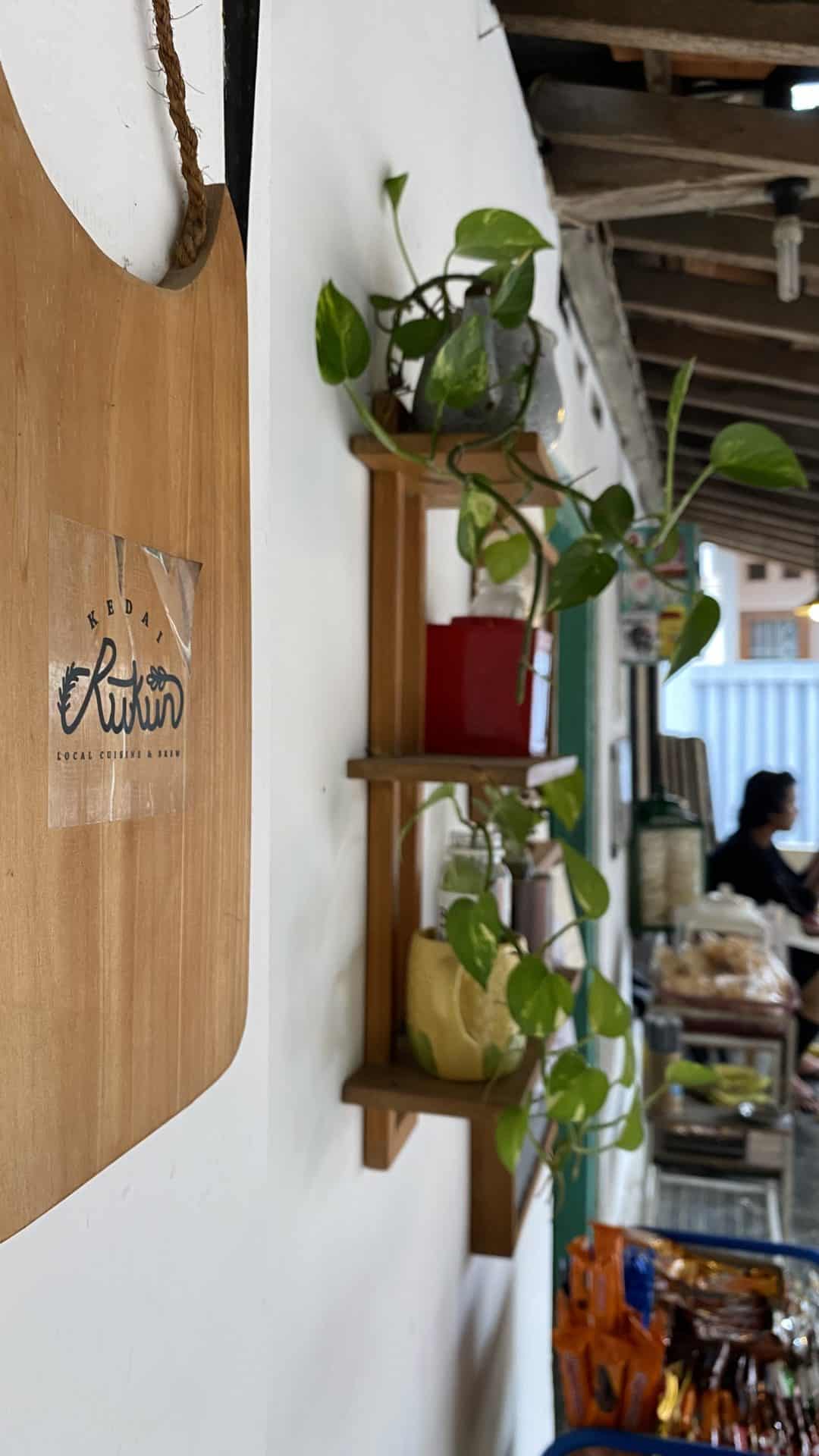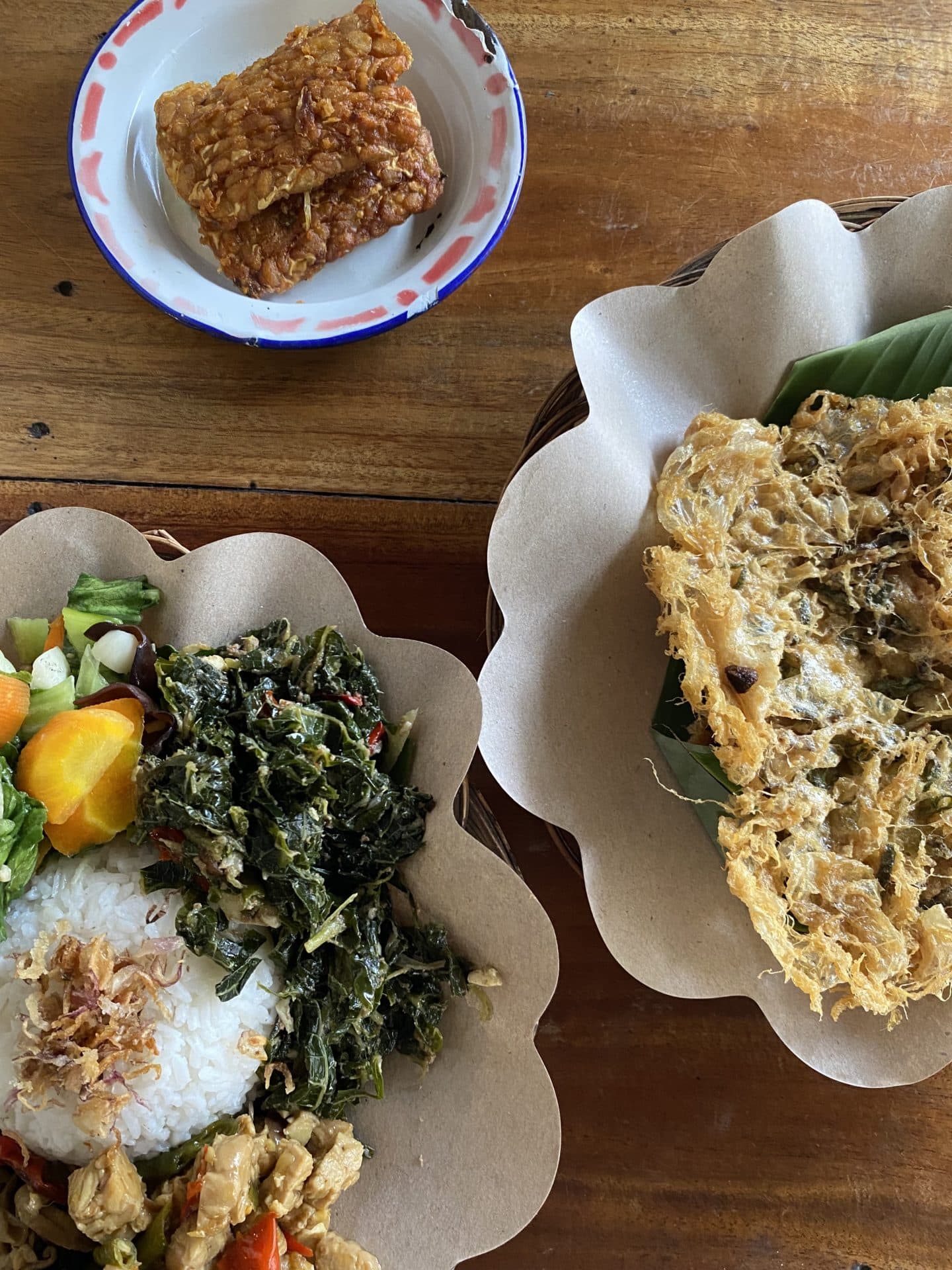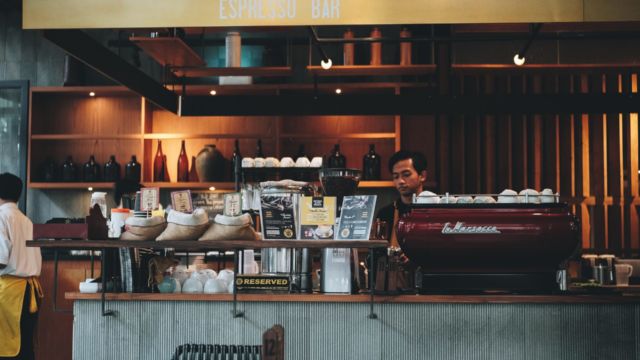The Taste of Home
Photo: Wahyu Nur Cayho.
Kedai Rukun restaurant | 2,873 words
Translated from Bahasa Indonesia by Dan Benjamin
The afternoon’s blazing sun was making me dizzy. Exhaust from the big black inter-city buses, and the unceasing honking of horns, fuelled my foul mood. If it weren’t for Anisa, my friend from a barista training program, telling me so insistently about a great restaurant she’d discovered, I would have chosen to take a nap instead.
It had begun on a WhatsApp chat. There, Anisa had suggested, though not quite directly, that Kedai Rukun, in her experience, offered a salve for those of us longing for our mothers’ home cooking. It was this promise which made me brave the blazing hot day.
One detail that propelled me on was what Anisa had said about Kedai Rukun’s es tapai susu, a cold drink of fermented rice or cassava, condensed milk, and ice. In my mind a startlingly-clear image formed of how delicious it would be to sip one on an afternoon like today. How my thirst would vanish thanks to that mixture of the sourness of the fermented contents, plus the sweet taste of the condensed milk – not to mention the ice. As if almost all life’s sensations can be enjoyed in tandem within a single drink.
Turning from the Wates-Purworejo road into an alleyway named Darussalam, so narrow only one small car could travel along it at a time, I already smelt it – aromas of a cooking able to lessen my longing. At the same time, I noted a certain atmosphere, too, in that alley, one more typical of village than of city life. The stinking hot afternoon wasn’t preventing little kids from chasing each other. Several women were sitting around watching, enjoying their children’s and grandchildren’s enjoyment. The cement road itself was village-like, having lots of holes filled-in roughly and speed-humps of widely-varying heights. After the fourth house from the mouth of the alley, I turned and entered a house with a white signboard out the front saying ‘Kedai Rukun’.
My preconceived notions about restaurants and diners disappeared as soon as I parked my scooter. This place – aside from a glass counter display showcasing a tantalising range of stirfried vegetables, from jipang, sohun, to daun pepaya – felt more like entering someone’s private residence. A regular, humble home, not pretending to be anything more – with a small front yard only big enough to fit a few parked scooters, and a residential-esque outdoor terrace transformed as if by magic into a place for customers to dine with four tables placed side-by-side. Inside was one more long table where guests could sit and eat counter-style.
I stood just inside the front door, next to the glass counter display full of stirfried sides. To my left was a shelf filled with snacks, from packets of potato chips to bread sold for 1,000 rupiah, about seven cents. To my right was a chalkboard on which a menu was scrawled: I saw several specials, plus two regular offerings, bakmoy and brongkos.
I chose bakmoy, and after the first taste, knew exactly why Anisa had been so unrelenting in telling me that Kedai Rukun’s food was ‘like the very best food my mother cooks’. Perhaps it was a product of witchcraft; perhaps not. But from the moment I placed the spoon to my lips and tasted the broth, I felt, aside from the terrific heat from the food itself, another, distinct kind of warmth stir within me.
Suddenly, my mind flashed back to an article I’d recently read online. It was about the lives of Indonesian internal migrants living in major cities like Jakarta, Surabaya and Yogyakarta. One part I particularly remembered was the discussion of ‘culture shock’. Generally, migrants come from relatively remote rural areas, the kind of places that hold firmly to particular customs and ways: perhaps ways of speaking, perhaps ways of dressing, or perhaps the way their palate reacts to different food which arrives on their tongues.
From the various ways that culture shock can manifest itself, the difference in culinary preferences was certainly one I felt when I first arrived in Yogyakarta or ‘Yogya’ from Kebumen, on the southern coast of Central Java. In the place I was born and raised, the food my mother cooked up had a distinctive taste. There were lots of spices, certainly, yet the final sensation was… just right, just enough, thoroughly tasty without blowing your head off. A taste fitting for food cooked with love.
After I migrated to Yogya, I was like a person shellshocked. I was taken aback by the foods I tried in my adopted city. Time after time I tried different dishes in different places, and always, the taste seemed excessive to me. Sometimes it was sweetness that dominated, sometimes saltiness. I didn’t find any place where I thought the food was really, truly a match for my mother’s home cooking.
Until I sat on the long, low communal counter at Kedai Rukun, facing a bowl of bakmoy whose steam was coiling up with balletic elegance. The aroma tantalized. My hand seemed to have developed a mind of its own and was impatient to start digging in. Yet I tried to go slowly, to draw out the moment and enjoy it. I took up a spoon, then, after mixing some spicy soy sauce into the bowl and stirring, I sipped the broth. Softly. Protractedly. Perhaps if this scene appeared in a comic there would be a lot of speech bubbles with the text ‘sssslllrrrpppp!’
As I swallowed more and more of the broth, I felt again that warmth which seemed not to be coming from the temperature of the food itself. A delicious feeling passed through me which seemed not to be coming merely from the spices used. The combination of sensations quenched my thirst, but more than that, I thought, began to lessen my longing, too. As I continued to eat, it seemed to me that what I had been searching for was not opulence in terms of items on a menu, nor the prestige level of any restaurant I ate in, but feeling full in these other ways, satisfying what all this time had constituted my deeper thirsts – my longing for my mother’s cooking, at our family home.
I went to pay for the meal. I certainly didn’t forget to say thank you to the owner of Kedai Rukun, whose cooking had lessened my longing. She was in late middle-age – in fact, I guessed her age was very close to that of my own mother, who’d just turned 55.

On this first visit of mine, Kedai Rukun wasn’t yet busy: I’d come at a time still too early for most of its customers. Because of that, I thought I’d chat a little with this woman. She introduced herself as Ibu Yuli Hari Astuti.
The subsequent discussion was all about me – my background, where I was from, how long I’d been in Yogya, what I did for a living. Even though my aim had been to ask about the food: about the spices and seasonings used, and perhaps some other secrets used in the kitchen by this woman whom other Kedai Rukun visitors called ‘Ibuk’. What transpired was the opposite of what I’d intended: I was the main object of discussion, asked questions by Ibuk, rather than me asking questions to her.
During the conversation, I felt an overwhelming yearning for my own mother. Every time I go home, my mother does this exact same thing to me. She always asks if I’m eating enough, if I’m keeping healthy, and how my work is going, together with advice that I should always take care of myself well in the distant city where I now live. And before I return to Yogya, she always cooks dishes of utter delectability, food that all but grips me so that I can’t quickly leave, so that I stay just a little longer.
It’s like my mother forgets that, on my too-infrequent trips home, I also want to hear about her. About her days, which she goes about by herself; about her neighbours for whom she buys food when she arrives home from work; about the soap operas that often keep her company until she falls asleep. But it’s like she doesn’t regard things that happen to herself as being important. What’s important is me, her son. This attitude I sensed all over again while I chatted to Ibuk Yuli.
After I switched on my scooter’s ignition and drove back to my kost, I vowed there would be other visits to this place.
*
Of course I’m hardly the only migrant in Yogyakarta. The city contains huge numbers of people who have moved here from surrounding areas – from Klaten, Kebumen, Wonosobo, Lumajang, and countless others. Sometimes it feels the arrivals are competing: for acknowledgement, for a sense of identity, even for a basic standard of living in this city that’s so much vaster than where they’ve come from. More than a few resort to elbowing each other, to treading on each other’s toes, to advance their own needs. But more than a few also look out for and protect each other. The very luckiest ones meet their partner in this way. Somebody who’s also a fellow migrant, who’s also scrabbling and fighting.
‘I don’t think I’ve ever found before this a bakmoy that tasted the same’. Very briefly, I thought I saw a teardrop in the corner of her eye.
I’m one of this group, for I’ve been blessed to meet Ayda, a woman of Chinese-Indonesian descent who is also a migrant from Kebumen. As I experienced culture shock in Yogyakarta, so did Ayda. And when it comes to food she’s even harder to please.
Knowing that we share an identical set of longings associated with home, I had no hesitation about inviting Ayda to Kedai Rukun.
Again, my timing was out, and we arrived too early. The four tables on the front terrace were still empty, though they’d been freshly-cleaned and stood ready for guests. We peeked through the front door to see Ibuk Yuli busy in the kitchen. Seeing us standing like statues, she left innumerable kitchen urgencies, stepped toward us and beckoned us in, while apologising for being late in opening.
What struck me most was her way of doing all this. She didn’t act like a usual restaurant-owner. Her way of speaking, her frequent apologies, her body language all seemed to be announcing that she was less a person running a business than a mother who’d been tardy preparing food for her children. Ayda and I glanced at each other for a second, absorbing the warmth of this woman, then smiled and waved away her apologies.
I thought: perhaps the key to the deliciousness of Kedai Rukun’s food was not the spices and sauces, but the sincerity and caring that Ibuk poured into every dish. The caring of a mother cooking her children’s favourite foods.
Today the menu had changed again, with a whole new set of specials. I heard Ayda asking Ibuk Yuli why it was only bakmoy and brongkos which were on offer every day.
‘Ah, you’ll have to ask him that’, Ibuk said, gesturing in the direction of Mas Bagus, her son.
Mas Bagus smiled and was silent for several seconds.
‘Kedai Rukun was left by my father’, he said finally. Before Mas Bagus’s father died, he left a small amount of money to open a restaurant. Initially, only two dishes were sold, bakmoy and brongkos. Brongkos is Mas Bagus’s favourite food, and he had always insisted there was no brongkos as delicious as that made by Ibuk Yuli. Bakmoy, meanwhile, was his father’s favourite food. These two menu items will always be on offer every day here, helping Mas Bagus to remember his father.
The story made me smile, even though the emotions were painful as well as pleasant. My mind’s eye filled with images of my mother, and my father, too, at home. I looked outside Kedai Rukun, to the street; I looked to where my scooter was parked; I looked to the quiet alleyway; I looked out to a world beyond. All that I saw, though, were the bags under the eyes of my mother, and those narrow cheeks of my father’s, because his teeth had fallen out one by one. The smile my mother wore when cooking us an afternoon snack found its way to me here – for without my being immediately aware, suddenly her smile had appeared on my own face.
I was dragged back to the here-and-now when Ibuk Yuli came to the table with our order.
‘Now, here’s a warm tea and some bakmoy for the young lady’, she said to Ayda. ‘And nasi remes for the gentleman’.
For several seconds our eyes were fastened on the food in front of us. The clear bakmoy broth, with an egg cooked in sweet soy sauce, enticed: I worried I was going to salivate. There were neat square slices of tempe and tofu, with a scattering of celery and fried shallots added to complete the dish. I was struck by how splendidly my food had been arranged on the plate. Several different stirfried vegetables had been laid out in a circle around the neat cup of white rice forming the dish’s centre, the colours contrasting pleasantly. Before I’d tried a single mouthful, Ibuk returned with the omelette I’d ordered, fried extra-crispily, until it turned brown, and topped by celery leaves and shallots. The omelette sat on its own plate, being almost as large as our mains.
‘I like this place, Mas’, Ayda said between spoonfuls of bakmoy. Steam from the thick broth rose up before her happy face. Her lips moved as she chewed, as if to a rhythm.
‘How come?’ I asked.
‘This bakmoy’, she said, as she swallowed a mouthful, ‘reminds me of my auntie’s cooking. Back when she was still with us she loved to make bakmoy – and the taste was just like this. Then after she passed, I don’t think I’ve ever found before this a bakmoy that tasted the same’. Very briefly, I thought I saw a teardrop in the corner of her eye. ‘But, yeah, this bakmoy, it really, really makes me miss her’.

Hearing that made me smile. As I ate my nasi rames, more memories flashed through my mind. Memories of my mother’s cooking. Her grumbling when I took too long to eat, her reprimands when she caught me giving some of my food to stray cats who hung around our house. Fifteen minutes passed in a tranquil silence, the only sounds being the scraping of our spoons and forks, our gulps of hot tea to wash down our food, and an afternoon breeze signalling that rain was on the way.
The restaurant was still quiet. Apart from the two of us eating, I only saw a few neighbours who popped into Kedai Rukun to say hello, plus some kids who began playing football in the laneway. In the distance, faintly, we could hear car horns. Eventually Ibuk Yuli sat on a chair behind Ayda – exactly the way a mother would do, accompanying her children after making them an afternoon snack. I watched quietly, my longing for my own mother growing.
Ibuk Yuli, once she saw our spoons and forks lined up neatly on our plates, stood up, and approached Ayda.
‘Hmm: and why haven’t you finished your food, young lady?’
‘I’m so full, Bu’.
‘Well, that won’t do at all – you ought to finish your food. Spare a thought for the person who cooked it. In future, if you want to eat here, maybe I’ll give you a half-portion, okay? So none’s left over’.
Hearing this grumbling, Ayda was only silent, while I grinned. Just like my mother. I reached for Ayda’s bakmoy and polished it off, to make Ibuk Yuli feel better.
The afternoon was almost extinguished: the clouds were starting to look darker, and faintly I heard the adhan call for the Maghrib prayer. Swallows were flying in long loops, searching for food, while the sound of a scooter got louder until the bike finally entered the restaurant’s yard. Time for the dinner rush – Kedai Rukun had begun to fill with all those seeking to lessen their longings for home.
Feeling that our own appetites had been satisfied, including our own longings for home, we paid for our food and said goodbye to Ibuk Yuli, who was now busy in the kitchen stirring a large pot full of meat brongkos. Steam filled the kitchen, the heat leaving beads of sweat on her forehead. Hearing us, she stopped, gripped our hands, then walked us to the front door. Right until the moment I drove the scooter around the corner from the alley onto the main road, in my side-mirror, I saw her standing there still.
My right hand revved the gas. Ayda’s grip on my waist tightened. We rode home on my scooter with smiles that got steadily bigger. We felt full.
© Wahyu Nur Cayho
English translation © Dan Benjamin






